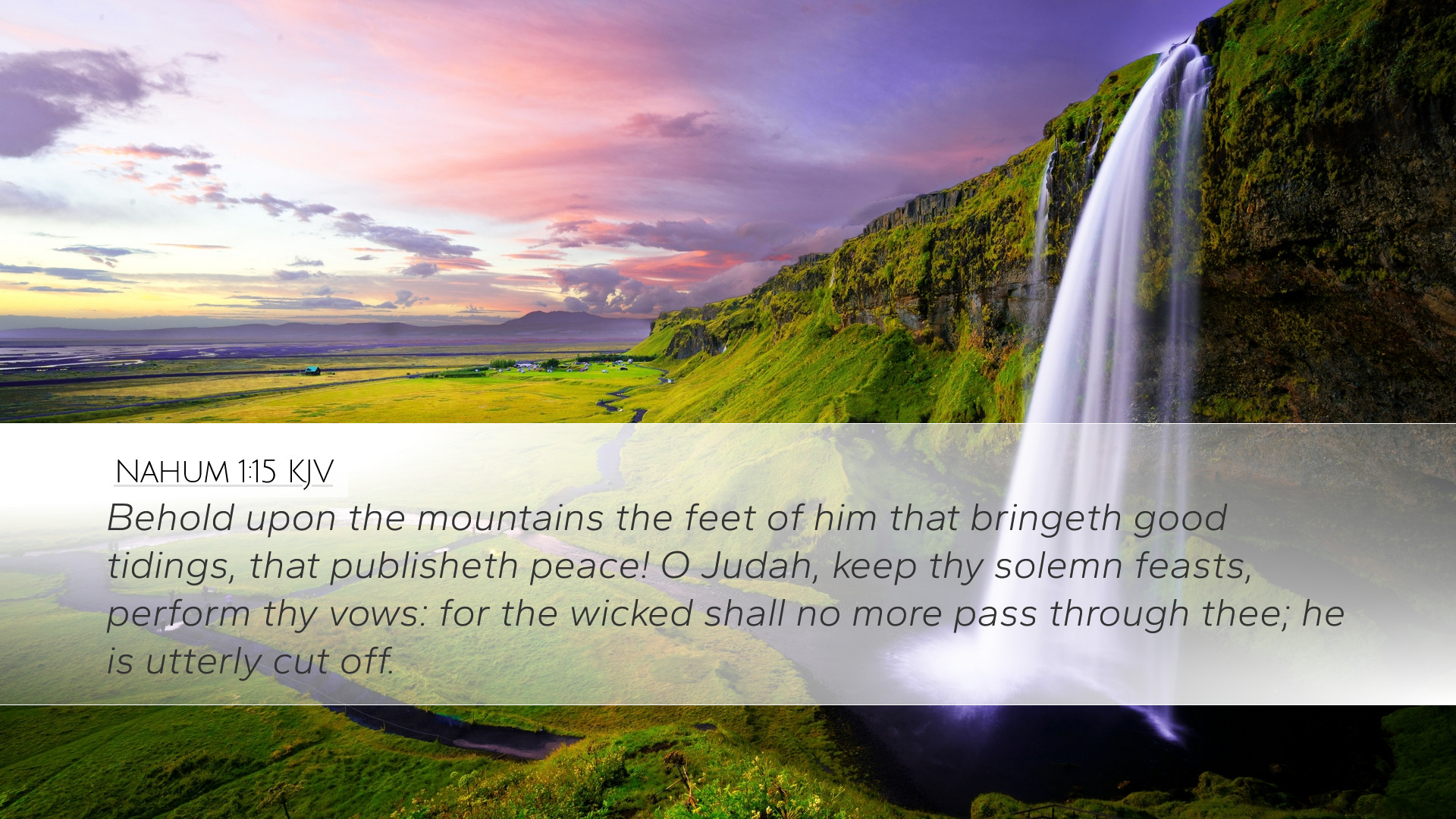Old Testament
Genesis Exodus Leviticus Numbers Deuteronomy Joshua Judges Ruth 1 Samuel 2 Samuel 1 Kings 2 Kings 1 Chronicles 2 Chronicles Ezra Nehemiah Esther Job Psalms Proverbs Ecclesiastes Song of Solomon Isaiah Jeremiah Lamentations Ezekiel Daniel Hosea Joel Amos Obadiah Jonah Micah Nahum Habakkuk Zephaniah Haggai Zechariah MalachiNahum 1:15
Nahum 1:15 KJV
Behold upon the mountains the feet of him that bringeth good tidings, that publisheth peace! O Judah, keep thy solemn feasts, perform thy vows: for the wicked shall no more pass through thee; he is utterly cut off.
Nahum 1:15 Bible Commentary
Commentary on Nahum 1:15
Nahum 1:15 states: "Behold upon the mountains the feet of him that bringeth good tidings, that publisheth peace!" This verse is rich with theological implications and prophetic insight, highlighting the themes of deliverance, peace, and the proclamation of good news.
Overview
The book of Nahum is predominantly a prophecy concerning the city of Nineveh and God's impending judgment upon it. Here, the prophet shifts focus to a more uplifting message, invoking the imagery of messengers who herald joy and salvation.
Historical Context
The message of Nahum is set against the backdrop of Assyrian oppression. Nineveh was notorious for its cruelty and idolatry. The reference to "good tidings" starkly contrasts with the prevailing atmosphere of fear and despair imposed by Assyrian rule. This verse suggests a coming change, a renewal in the status of God’s people.
Theological Significance
The imagery of "feet upon the mountains" illustrates the anticipation of a messenger delivering news of victory and peace. In biblical tradition, mountains symbolize strength and prominence, thus conveying the idea of stability and the reach of God's promise.
Good Tidings
- Messengers of Hope: This verse reinforces the role of messengers within the biblical narrative. Similar to Isaiah 52:7, the feet symbolize the arrival of those who bear significant news.
- Fulfillment of Promise: The proclamation of peace indicates the fulfillment of God’s covenantal assurances to His people, reminding them that deliverance is at hand.
Peace as a Divine Gift
Peace is not merely the absence of conflict; it is a profound state of wholeness and restoration. The good news proclaimed is synonymous with God's intervention in human affairs, providing a pathway to reconciliation with Him.
Insights from Public Domain Commentaries
Matthew Henry's Commentary
Matthew Henry emphasizes the joy that accompanies the arrival of the messengers bringing good tidings. He notes that such proclamations serve as a reminder of God's sovereignty and His concern for His people, and that these tidings are to be celebrated in the hearts of the faithful.
Albert Barnes' Notes on the Bible
Albert Barnes extends the application of this verse by reflecting on how believers today are called to be bearers of good news, particularly in the context of the Gospel. He highlights the importance of spreading the message of salvation, echoing the prophetic tradition rooted in Israel. He also suggests that these feet, symbolic of the spread of the Gospel, indicate a movement toward redemption rather than condemnation.
Adam Clarke's Commentary
Adam Clarke interprets the proclamation of peace as not only a physical liberation from oppression but also as a spiritual revival. He points out that the contrast between the impending judgment on Nineveh and the peace promised to God’s people is crucial to understanding God’s character as just yet merciful. Clarke also emphasizes that the phrase "good tidings" can refer to the announcement of both divine judgment and divine mercy. Both aspects are significant in understanding God's dealings with humanity.
Application for Today
The message encapsulated in Nahum 1:15 resonates profoundly in today's context. The church is called to embody the role of the herald, proclaiming the peace that comes through Christ. Here are a few applications:
- Proclamation of the Gospel: Just as messengers brought good news to Israel, contemporary believers are encouraged to share the peace of Christ with a world still ensnared in sin and conflict.
- Hope in Troubling Times: The imagery of peace amidst turmoil serves as a reminder that God intervenes in human affairs. This should inspire confidence in God's providence and His ultimate plan of redemption.
- Community and Reconciliation: Followers of Christ are called to be agents of peace, working towards reconciliation in divisive situations, embodying the peace that the Gospel brings.
Conclusion
Nahum 1:15 stands as a powerful testament to God’s love and justice. The announcement of good tidings and peace is a crucial element of hope—not just for the oppressed of Nahum’s time, but also for all generations. As pastors, students, and scholars reflect on this verse, they are reminded of the importance of sharing the message of peace and hope found in Christ, ensuring that the feet of those who bear such tidings remain vital in the life of the church and the world.


